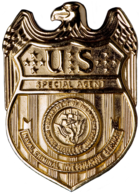
Back خدمة التحقيق بجرائم البحرية Arabic Serviciu d'Investigación Criminal Naval AST Naval Criminal Investigative Service Breton Námořní kriminální vyšetřovací služba Czech Naval Criminal Investigative Service Danish Naval Criminal Investigative Service German Servicio de Investigación Criminal Naval Spanish Mereväe Kriminaaluurimisteenistus Estonian Naval Criminal Investigative Service Basque سرویس تحقیقات جنایی نیروی دریایی Persian
| United States Naval Criminal Investigative Service | |
|---|---|
 The NCIS logo | |
 Seal of the Naval Criminal Investigative Service | |
 Badge of an NCIS Special Agent | |
| Abbreviation | NCIS |
| Agency overview | |
| Formed | December 14, 1993 |
| Preceding agencies |
|
| Employees | 2,500 |
| Annual budget | US$460 million (2009) [1] |
| Jurisdictional structure | |
| Federal agency | United States |
| Operations jurisdiction | United States |
| General nature | |
| Operational structure | |
| Headquarters | Russell-Knox Building, MCB Quantico, Virginia, U.S.[2] |
| Special agents | 1,250 |
| Agency executives |
|
| Parent agency | United States Department of the Navy |
| Units | Units
|
| Field offices | 17
|
| Facilities | |
| Cars | Dodge Chargers, Ford Crown Victoria Police Interceptors, Cadillacs (Protective Operations) |
| Website | |
| ncis.navy.mil | |
The United States Naval Criminal Investigative Service (NCIS) is the primary investigative law enforcement agency of the U.S. Department of the Navy. Its primary function is to investigate major criminal activities involving the Navy and Marine Corps, though its broad mandate includes national security, counterintelligence, counterterrorism, cyberwarfare, and the protection of U.S. naval assets worldwide. NCIS is the successor organization to the former Naval Investigative Service (NIS), which was established by the Office of Naval Intelligence after the Second World War.
One half of NCIS personnel are civilian, with the other half being US government investigators — 1811 series special agents. NCIS agents are armed federal law enforcement investigators, who frequently coordinate with other U.S. government agencies and have a presence in more than 41 countries and on U.S. Navy vessels. NCIS special agents are supported by analysts and other experts skilled in disciplines such as forensics, surveillance, surveillance countermeasures, computer investigations, physical security, and polygraph examinations.
- ^ "NCIS budget" (PDF). Retrieved April 27, 2016.
- ^ "NCIS Headquarters". Naval Criminal Investigative Service. (ncis.navy.mil). Retrieved December 5, 2019.
- ^ a b c Leadership, NCIS